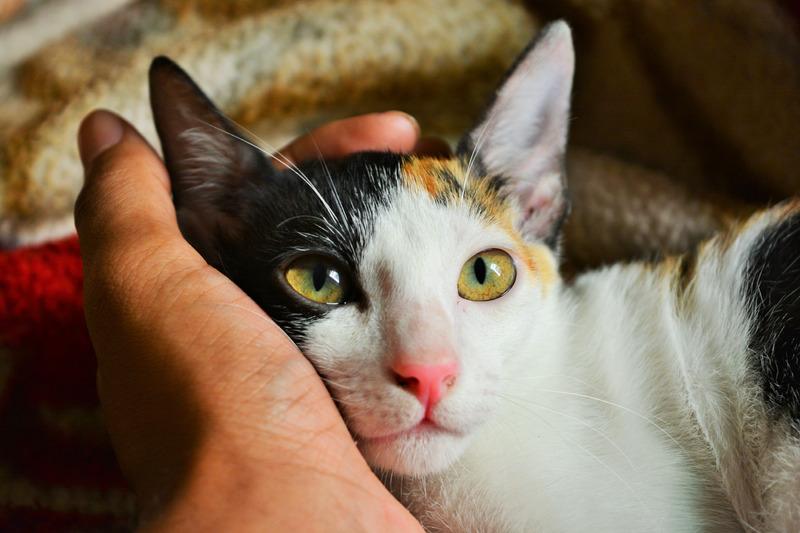
When a family member or loved one dies we turn to ceremonies to help build a bridge toward healing. For most pet owners, however, things aren’t quite as straightforward. Despite the fact that most people consider their animals to be members of the family, society has been slow to recognize the intensity of the grief that comes with the loss of a pet.
Fortunately, things are changing. One of the people working to make that happen is Laura King. Laura is a certified life-cycle celebrant who specializes in creating custom ceremonies to honor pets. Funeralwise was lucky to have the chance to talk with Laura to learn more about how she came to become a pet celebrant and how we can give the animals we love the special send-off they deserve.
How did you come to be a pet celebrant?
I have always joked about being both blessed and cursed by being right-brained and left-brained. I love the fine arts, natural science, and medicine. I started a healthcare marketing firm when I was 27 years old, took on a business partner 10 years later, and continued in that field for five more years as both the strategist and creative director. Life was good. I enjoyed my work. I had a beautiful son and a household full of pets in enchanting New Mexico. But I began to feel a longing to be part of something more meaningful.
On a whim of sorts, I enrolled in a continuing education course at UNM that was taught by a western Buddhist nun. I fell madly in love with Buddha’s teachings in their contemporary translation. Fast forward 18 months, and picture me in ordained robes at an international retreat in upstate New York, working full time as the executive director while living with monks, nuns, my teenage son, our cat Princesa and dog Apollo. I made some prayers to find a path of real depth and purpose, and lo and behold!

Laura King is a pet celebrant based in New York City.
But my path has never allowed me to stand still for very long. After 7 years at the center, I felt called very strongly to leave my position and my ordained life. What I was to do next wasn’t so apparent, but I had faith in the benevolent universe and our evolutionary process, so I followed my intuition and moved as a layperson to New York City—a world onto itself and place of all possibilities.
I worked as a writer and taught meditation in Harlem for the first few years. I was also beset by lots of challenges, including a health issue that required surgery, my son’s military deployment, the death of close family members, including my two beloved animals. But, when that proverbial rain began to fall it poured. I found a tiny white kitten on the sidewalk and took her in. I learned to bottle-feed a baby and I learned about street cats. There was a colony of feral cats on my city block, and I got certified by the ASPCA in “trap-neuter-return” (TNR) to spay/neuter and vaccinate them. I began to manage that colony and got involved with New York’s extensive volunteer animal rescue network.
One evening I attended a party and sat next to a woman who was leaving to officiate a wedding. I was intrigued—that sounded like such joyful work! I did some research and committed myself and became a non-denominational minister through First Nation Church’s St. Valentine’s Ministry. I enrolled in an in-depth program at the Celebrant Foundation and Institute in order to be certified as a Life-Cycle Celebrant. I began to think about officiating funerals, specifically.
A well-done memorial service is such a compassionate and kind gift to give both the deceased person and their family members. While I was in that specialty portion of the program, I had to choose euthanasia for my favorite street cat, which was heartbreaking. I also had various encounters with neighbors who were distraught after losing their pets too. The intense emotion and timing of these things served to turn my attention to pet-focused Celebrancy. This was an entrepreneurial area of need I could fill, and I received several very direct signs that seemed to say to me, “yes, this your new path; be confident and go this way!”
Again, I did some online research and decided to deepen my knowledge of the human-animal bond and the grief process following a pet’s death by enrolling in a certification program offered by the American Institute of Health Care Professionals. I became a Pet Loss Grief Recovery Specialist to prepare me to meet the bereaved people I would be working with and connect with them at the level of their loss and be truly present and supportive on their path towards healing. These certifications work very well together. It’s interesting to me that all the various pieces of my life seem to knit themselves together in this new career as a Pet Celebrant. Two years ago, I didn’t even know what a Celebrant was. I’m reminded once again that the universe is so much more creative than I am!
Why do you think that we have become more accepting of pet funerals?
Over the last decade or so, pets have certainly become more appreciated for their gifts. I just saw this past week in an American Veterinary Medicine Association report for 2017/18 that 85% of dog owners and 76% of cat owners believe their pets to be family members.
It seems to me that two factors, in particular, have helped this along. The first is media coverage of natural disasters, beginning with 9/11 and Hurricane Katrina, and continuing to present day news following storms and fires. We witness people separated from their pets under horrific conditions. Animals left to fend for themselves with people desperate to return to them or to locate them after the rescue. And people who chose to die rather than being separated from their pets. I remember a heart-wrenching news story about a blind elderly woman who refused to leave the roof of her flooded home onto a boat without her dog. News coverage has made us all more aware of the importance of our animals to us—especially when people have already lost every material thing. In many places, evacuation strategies and post-disaster care plans now make serious attempts to keep people and animals together.
The other thing that has elevated our awareness of the human-animal bond is social media. There are millions of cat Instagram accounts and Facebook pages. Some of them have more than a million followers! Whether it’s the joy of adopting, or the worry that’s involved with sickness, the details of an animal’s passing, and the profound sense of loss in the aftermath, ALL of that gets shared. And followers closely empathize and offer kind remarks and emojis in return.
Loving pet ownership is so well supported on social media. I really do think this has allowed people to feel comfortable to love more openly and express their deep grief and not be considered crazy, weird, or extreme. This is one of social media’s real upsides, as far as I’m concerned.
Do you think there is a difference between a funeral and a celebration of life?
If we view them in the framework of our culture, they might not be so different structurally, but they’re going to be different emotionally. Funerals often have a body present. Planning must happen quickly while the loved ones are distraught. Attendees may still be in shock, and grief is raw, so funerals tend to be more sorrowful occasions.
Within a Celebration of Life service, a body is generally not present but can be. A family might call a funeral service a Celebration because they want to communicate that there will be tears, but there will be laughter too and that people can expect to leave with a sense of uplift.
 Do you find that the people that want to hold a celebration of life for their pet have anything in common?
Do you find that the people that want to hold a celebration of life for their pet have anything in common?
There are many types of relationships people develop with their pets, and that will affect their grief and the grieving process. An animal can be a child, a soulmate, a best friend, a protector, it can be a confidante, a comforter, an extension of a body, the impetus for a social life. Each loss is very individual, but the common thread is very pure love and love moves us to honor and celebrate it.
Where are ceremonies typically held?
In the greater New York City area, pet ceremonies are usually done in people’s homes or apartments, but they can take place in a park or a backyard. But many are indoor experiences.
How do families incorporate children in the process?
It seems to me to be natural and important for children to be involved with a pet’s end-of-life matters. Mental health professionals generally encourage children to be informed and given the option to participate, even in the case of scheduled euthanasia or through hospice. It depends on the age and maturity of the child, of course, but once they have some level of understanding, to be included and participate can be an important teaching experience, and emotionally very beneficial. I think that familiarity with death as natural and inevitable helps us all appreciate the preciousness of life.
How much involvement do your clients have in designing the actual ceremony?
I use my creativity, intuitive skills and ceremonial experience to guide us back and forth in co-creation. I start with a pretty casual interview process. Clients and I have a conversation around a set of questions and I also get input from any other important people—other family members, a rescuer or dog walker, for example. The ceremony is crafted very thoughtfully to reflect the client’s values, beliefs, wants and needs—and to celebrate the animal’s life and relationships.
In essence, what takes place within the ceremony is the sharing of a beautiful life story, the honoring of loss and longing, and the reassuring that true love lives on forever. And that’s really valuable to people. My client always gives final approval to a ceremony.
When you meet people and they find out what you do, how do they react?
It’s very much fun to share what I do. When I introduce myself to someone as a Pet Celebrant and explain that it is someone who creates ceremonies for animals and their people and that I’m also a Pet Loss Grief Coach, it usually gets quite an interesting reaction. The kind responses that have encouraged me as have I ventured out in this new field.
With animal people, I explain that I offer adoption ceremonies, euthanasia support, memorial services, and pet loss grief coaching, and they just get it. They often say something like “I’m just going to keep this card because I have a friend who just lost a dog.” Or they’ll share from their own knowing how hard pet loss is, and tell me my services are really needed. I think I’m in the right place at the right time.
Do you think the way we memorialize pets will be different 5 years from now, 10 years from now?
I definitely think this will become a normal and usual thing given that half the population of the U.S. owns animals, and over 75% of cat and dog owners believe their animals are family members. A pet is no longer “petty.” It’s a full-fledged member of the family!
Another interesting fact to consider is that there are now at least four states where it’s legal to include animal ashes with human remains in a cemetery. I’m sure that too will become a more common occurrence. I know a lot of people who would choose for their animals to be with them forever as a soulmate and in the cremains. So, yes, pet memorials will continue to evolve. Watch that space!
Is there anything that you would like our readers to know about creating a pet memorial ceremony or about you?
I would like to encourage readers to unabashedly celebrate their animals. That human-animal bond is a very special love that may be unique in their lifetime—pure, profound and unconditional. Often people dare to open their hearts to give their very best to their animal companions; their best self, joyful self, patient self, their most loving and forgiving self. In my mind, that sweet love between human and animal beings mimics a spiritual love. It teaches us so much.
And in addition to the important end-of-life ceremonies, I’d like to suggest that animal people have some fun and fanfare when adopting. This is a very special moment—a new baby in the house. Whether it’s 2 or 4-legged, or if it has fins, all creatures are precious. Every life milestone is a great opportunity to have a loving party.
In fact, I’d like to encourage Funeralwise readers to just celebrate in general—to make it a habit of honoring and cheering themselves, each other and their pets on ANY occasion that moves them. Ceremonies enrich our lives, and they help us be fully and authentically present at threshold moments, to appreciate what has gone before and embrace with confidence what comes next. To really live. To be more human. Our ancestors knew this, and we’re relearning it. And please tell your readers to call a celebrant expert to help guide their way! We love making ceremonies.
Click here to visit Laura King’s Honoring Animals With Ceremony Website
Click here to visit our Pet Loss Pages
Do you have something to add to this story? Please add it in the comments.
 Do you find that the people that want to hold a celebration of life for their pet have anything in common?
Do you find that the people that want to hold a celebration of life for their pet have anything in common?









Jan Barnes
Aloha, Dearest Laura and Followers
My heart is dying piece by piece every day for all the billions of innocent defenseless dogs and cats that are tortured and slaughtered worldwide all year for meat and entertainment. One horrific example is the Yulin dog and cat massacre that will begin next month. Also, there are billions of other innocent defenseless animals that face similar fates. Can there be a worldwide vigil that can commemorate the animals that we are powerless to save? Maybe then we can receive the miracle we so desperately need to end this! Please reply.